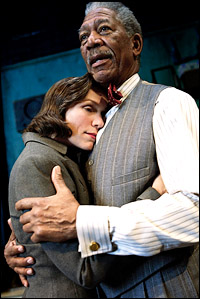
*
Is it a mirage, or is that Morgan Freeman back on Broadway after two decades of intense filmmaking? What returned him to his stage roots he can tell you in one word: "Mike."
Freeman's screen hiatus started with a picture called "The Bucket List," in which he and Jack Nicholson played a couple of old coots who draft a Things To Do Before I Die list — then do them. "I have a bucket list, too," says Freeman, "and Mike Nichols is on it. He proposed we do this a few years ago, and I said no, but he kept coming back to me with the names of all these fabulous people he'd lined up for me, until he finally just wore me down. The idea of walking the stage with the likes of Frances McDormand and Peter Gallagher — how could I pass that up? Also, it occurred to me that it might be my only chance to do this."
"This" is The Country Girl, by a very knowing Clifford Odets — a backstage drama with a blue-ribbon heritage: It was on Broadway in 1950 and 1972 (first with Paul Kelly, Uta Hagen and Steven Hill, then with Jason Robards, Maureen Stapleton and George Grizzard) and on screen in 1954 (with Bing Crosby, Grace Kelly and William Holden).
 |
||
| Morgan Freeman with Frances McDormand in The Country Girl. |
||
| photo by Joan Marcus |
Folks forget the vicious pimp in "Street Smart" that catapulted him into the filmmaking firmament (and his first Oscar race), just as they forget the out-of-control wino in The Mighty Gents that hiked him to Tony consideration and his place in the Hollywood sun.
"After 'Street Smart,'" he recalls, "it was, like, 'We have another one of those characters for you to play.' Instead, I did 'Lean on Me' and 'Glory' and 'Driving Miss Daisy' so I had this nice little movement of parts. Those three roles were men who had the power of personal presence. Of course, I got an audience who preferred that. You can easily get trapped by the idea, just promulgated, that your audience wants to see you in certain types of roles."
Thus, the man who played God — twice, for gosh sakes (in "Bruce Almighty" and "Evan Almighty") — was glad to add a warts-and-all Frank Elgin to his gallery. "The idea that people are drawn to you in a certain way is a double-edged sword. It's beneficial for an actor to do different roles. I always want to play someone I haven't done before — that's the whole point. Why do anything if you're not pushing the boundaries of your experience?"
Bizarre as it now seems, Freeman began his showbiz career as a dancer, arriving in New York in time for the 1964 World's Fair. Musical roles constitute half of his Broadway career: He debuted in the all-black Pearl Bailey–Cab Calloway Hello, Dolly! (in David Hartman's original slot of Rudolph, the long-stemmed head waiter at the Harmonia Gardens); he was Purlie-for-a-month while Cleavon Little was away filmmaking; and he was last on the Main Stem lording over the gospel musical The Gospel at Colonus for 61 performances.
"Dancing — being not something you can just sort of do — means you're dedicated. And I was, right to the moment I wasn't." He knows where and when: "I had a great epiphany in 1966 on a 14-week bus-and-truck tour of The Royal Hunt of the Sun. It wasn't a dance show, but they got dancers for the Inca movements. One night at Coe College in Cedar Rapids, the lead was sick, the domino effect rippled through the cast and I found myself onstage acting a role I was understudying. It hit me, like a bolt of clarity, what to do with my life."
But film fame made him stage-scarce, even stage-scared. "Driving Miss Daisy" playwright Alfred Uhry tried driving him back for Without Walls. "Ultimately, I felt I didn't like the idea of doing a play. All my life I wanted to be in movies. I worked 20 years on the New York stage waiting for my call. Now I'm going to turn 'round and run back? I don't think so."
Fortunately, Mike Nichols wouldn't take no no no no for an answer. "As a director, he's all he's cracked up to be. I think he sees his job as a collaboration with the actor. It's very easy to make me feel inadequate, especially if you start pushing me. Trust me, it's true."
Well, then Morgan Freeman has done a bravado cover-up in life. "I already know how my tombstone will read," he throws out with a wink. "‘Here Lies The Great Pretender.'"
But for now, for what's ahead of him, he's accentuating the positive. "Solid role. Solid cast. Solid director. Can't fail." Then, he grimaces and crosses his fingers. "Can it?"
Five minutes, Mr. Elgin . . .









